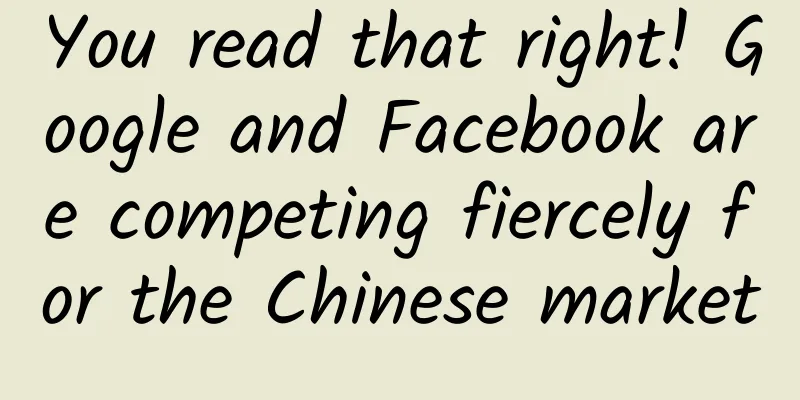You read that right! Google and Facebook are competing fiercely for the Chinese market

|
In 2014, Google and Facebook, two global platform giants headquartered in Silicon Valley, spread the war to Asia. China became a market they were fiercely competing for - yes, you read that right. Google and Facebook, their websites and most of their mobile applications cannot be smoothly accessed and used in mainland China, but this does not prevent them from competing directly in mainland China: their targets are Chinese advertisers who have global expansion needs and are constantly increasing their overseas promotion budgets. Currently, Google's business in mainland China is mainly divided into three parts: development of some global advertising products, advertising sales, and mobile developer and partnership relations - hundreds of employees in Google's offices in Shanghai and Beijing support these businesses. Facebook, which was once rumored to be opening an office in China, has also started advertising sales in China and is recruiting a mobile developer relations manager for the mainland China market. Since the beginning of this year, both traditional Chinese advertisers and Chinese Internet companies have been spending more and more on overseas promotion. An industry insider who is responsible for the overseas expansion of an Internet product revealed to PingWest: Overseas market promotion is very hot now. Some domestic advertising overseas optimization teams with only 7-8 people can even have a monthly turnover of several million US dollars, and a net profit of hundreds of thousands of US dollars. Huang Ping, director of Google's advertising operations in Greater China, also confirmed to PingWest: Google Analytics analysis tools and mobile platform advertising tools Google Admob have been integrated. Developers on the Google platform can more easily implement in-app purchase advertising recommendations, and can use different forms of display ads such as text, pictures, banners, games and videos to achieve their promotion effects. Businesses related to this area are now the main growth driver of Google's advertising business in China, and its typical customers are those Chinese Internet companies and developers that are expanding overseas. Another part of the continued growth comes from large Chinese companies and local governments that are trying to "go global." "We are looking forward to working with more provincial governments," Richards Gilbert, head of Google Ad Solutions for Greater China and Korea, told PingWest at a recent Google event in Taipei. "Many local tourism bureaus in China use Google's advertising platform to attract overseas tourists. The Chengdu local tourism bureau has achieved very good results with its ads on YouTube, and Shandong Province has also done well." This is exactly the target customer that Facebook is competing for in Chinese advertising. According to PingWest, in early 2014, Facebook Vice President Vaughan Smith visited China several times to meet with local government tourism bureaus and agencies responsible for overseas promotion, including Google's "demonstration partner" Chengdu Tourism Bureau. In addition, Facebook also communicated with the local tourism bureau of Zhangjiajie, Hunan Province, trying to persuade them to promote their "tourism business card" through Facebook. Of course, the more intense competition targets of both parties are still Chinese Internet companies and mobile application and game developers that have been targeting the global market from the beginning. They are more sensitive to the role of Google and Facebook as high-quality overseas channels and embrace them more actively. Facebook, with an average of 1.35 billion monthly active users, is also a high-quality overseas channel in the eyes of advertisers. In the first half of 2014, Facebook also poached some advertising sales talents from Google to serve the growing needs of advertisers in mainland China. However, due to practical reasons, Facebook later chose to temporarily place these employees in its Hong Kong office. As early as two years ago, Facebook divided its advertising business in China to two general agencies, which then divided it to more sub-agents for advertising sales. Facebook only provided some basic advertising technology and solution training to these agencies, but an insider revealed to PingWest: Now Facebook's sales team will not only directly contact large advertisers, but also come to visit in person to further popularize Facebook's advertising delivery mechanism and bidding rules, and Facebook's response speed to customer questions and needs is also quite fast. For Google, since the two offices in mainland China are both engaged in advertising sales and operations, it is easier to communicate with major customers. Currently, Google uses a combination of agents and direct advertising services in mainland China. According to some of Google's mobile developer advertisers, Google's sales representatives and customer service representatives often intentionally or unintentionally test some familiar and closely cooperating advertisers, asking them about their advertising on Facebook, the results, and whether the budget will continue to increase. This means that the competition between Facebook and Google for advertisers in China has become increasingly fierce. "I don't mind competition at all, and there has always been competition," Richards Gilbert, head of Google's advertising performance solutions for Greater China and Korea, told PingWest. "Chinese advertisers are advertising overseas through YouTube and Google Display Network, and this service is competitive." For most advertisers, price is definitely one of the main references for advertising. According to PingWest: On average, the price of single keyword advertising on Facebook is 30%-40% lower than that on Google Adwords - this is usually closely related to the advertising area and advertising optimization agent chosen by the advertiser. For example, if you want all traffic, the price of AdWords can be relatively low, about 20 cents, but if you choose some European and American countries, sometimes you may not be able to buy a user for one dollar. But overall, the cost of advertising on Facebook is 30-40% lower than that on Google Adwords. But low prices also have limitations. Facebook’s new advertising network, “Facebook Audience Network”, was launched not long ago, and Facebook has only 1.3 billion monthly active users. After advertisers have “washed” these users over and over again at low prices, the cost will continue to increase. This means that the cost of advertising on Facebook for Internet companies that have been promoting overseas for a period of time will become higher and higher, and may even be higher than Google Adwords. In comparison, Google does not have this problem - because it has a more "massive" user base, for advertisers, whether it is just starting out or has been running for more than a year, the cost of this platform will not change much. Because Google has a large user base and strong mobility, and there are different and cross-ad presentation methods provided by different platforms such as Google web pages and mobile direct search, YouTube and Google Play, it is basically difficult for advertisers to reach all these users, and the Google Display Network platform itself is also updated from time to time, and more statistical analysis, advertising alliances and mobile application cross-promotion forms are integrated. In this way, we can also understand why Facebook wants to promote the "Facebook Audience Network". In addition to the user limit mentioned above, another major problem with Facebook's advertising platform is that data cannot be tracked. On Google, advertisers can place a link to a channel number and then analyze the next-day activeness, 7-day activeness, user behavior, etc. from this channel, but Facebook will block this channel number. Although this problem can be solved by embedding the SDK, it will cause new problems. Of course, Google's advertising platform also has its own problems. Some mobile developer advertisers told PingWest that Google Analytics' backend will count the number of installations, but this is very different from the activation data counted by advertisers themselves. Although there is a certain gap between installation and activation, the data gap counted by Google is still beyond imagination. Richards Gilbert, head of Google Ad Solutions for Greater China and Korea, explained that most Chinese advertisers still only care about the effect of the "last click", believing that only the last click and purchase is considered an effective advertisement. However, in the mobile environment, the presentation of advertisements has changed a lot. Many advertisements are presented in the form of cross-promotional advertisements or even games. Even if there is no last click, users who see the advertisements have actually "consumed" these advertisements. "The player who kicks the ball is not just the last one to score a goal," Glibert told PingWest. He believes that virtual advertisements in mobile games are an example. Now, these large Internet companies in China that have the need to expand into the international market, such as Baidu, Tencent, Kingsoft and Cheetah Mobile, will buy ads from Google or Facebook (Baidu has also become a customer of Google). Depending on the product, some of these companies will mainly invest in the Google platform, and then invest in the Facebook platform when the volume is insufficient; but other companies will mainly invest in Facebook because they think Facebook's user quality is better and the average revenue per user (ARPU value) is higher. Therefore, according to the different needs of advertisers, neither Google nor Facebook's advertising platform has an absolute advantage, which naturally makes the competition between these two companies in China increasingly fierce. However, the fundamental reason for this situation is the internationalization needs of Chinese Internet companies and some other types of companies. In the words of those in the advertising optimization industry, we are now in a "traffic dividend" stage, and we are making money from this momentum. This situation is basically not seen in other countries around the world. |
<<: Lenovo + Motorola + Xiaomi > Apple + Samsung
>>: Apple Pay: Apple's payment ambitions
Recommend
APP promotion: Detailed explanation of ASO promotion in Apple Store!
ASO traffic entrances are divided into app store ...
Uncovering the secret of Toutiao’s growth — A/B testing
In 2018, the growth of China's mobile Interne...
Catching up with Tesla, NIO is reportedly planning to develop its own chips
If traditional cars compete with each other in in...
Weilai's official Weibo account denies bankruptcy rumors: pure rumor
Recently, some self-media revealed that NIO is in...
Is menstruation for expelling toxins from the body? Is menstrual blood waste blood? Stop misunderstanding women's menstrual periods!
gossip I believe you have seen this statement on ...
Carbon dioxide can be used to make plastics? You heard it right!
Author: Li Chuanfu Shi Xiangqi As the global clim...
A revolutionary breakthrough in Android performance? A detailed explanation of the technical principles of Huawei's Ark Compiler
At the Huawei P30 series domestic launch conferen...
September marketing promotion hot calendar!
Autumn is the season of harvest. In the upcoming ...
Case analysis: How to optimize information flow advertising during the off-season?
In recent years, with the implementation of housi...
Is the sound heard in the conch the sound of the ocean?
Take a walk along the beach, pick up a conch carr...
All the cold you have experienced has been captured by China's Fengyun satellites
"Cold" is undoubtedly the keyword of th...
Nidong SEO fast ranking practical explanation worth 4800 yuan VIP tutorial (with click tools) (Baidu network disk)
Hello everyone, I am Nidong! In this class, we wi...
How to build a habitable planet? An interview with Charles Langmuir
【Author】Xu Yigang 【Translation】Zhao Siyu, Yang Ya...
How much does it cost to make a Guilin health products mini program? What is the price quote for the production of Guilin health products mini program?
Mini programs provide convenience for publicity a...









